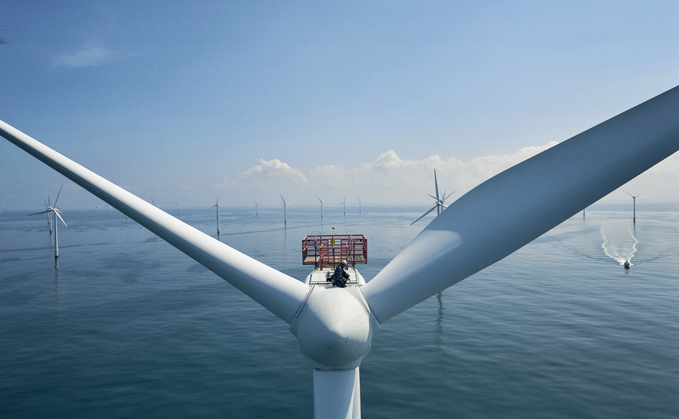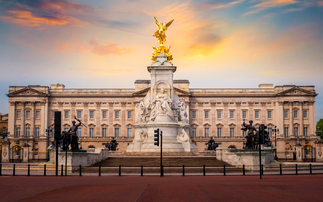
Vattenfall's Horns Rev 3 wind farm in the North Sea | Credit: Vattenfall
The attacks on the government's net zero agenda are now reportedly coming from within the Cabinet, but vague criticisms of climate action do not add up to a credible alternative plan
Hold on, haven't we seen this one before? The escalating attacks on the government's net zero strategy from a small band of Tory backbenchers and unnamed Cabinet Ministers is becoming frustratingly reminiscent of the repeated and largely futile attacks on 'red tape', and not just because they involve many of the same people.
You'd be forgiven for forgetting about the government's multiple 'red tape challenges', given the results have been laughably negligible. The promise to save 'billions' by slashing red tape remains the calling card of a government that has completely run out of ideas, which is worrying because by my count Conservative administrations have launched at least three of these fatuous exercises over the past 11 years.
This process always goes the same way. An embattled Conservative Prime Minister wants to throw the right wing of the party some red meat, so they promise to review and cut red tape. At this point they are asked what regulations they actually want to cut and are so flummoxed by this predictable question they end up babbling some nonsense about newts or water voles stymying development. Civil servants then dutifully run off to try and find anything on the statute book that is genuinely outdated or counter productive, only to return several months later having found next to nothing that can be cut without serious economic, environmental, and/or legal consequences, as well as likely political uproar. My personal favourite red tape challenge was the 2011 exercise that resulted in a government press release proudly trumpeting the fact Ministers had taken the brave decision to repeal legislation governing the treatment of pit ponies.
There was a similarly bathetic progress update this week on the forever war on red tape hidden in the government's self-parodying report on the myriad benefits of Brexit. With the air of a kindly, but tired (oh, so tired) primary school teacher insisting 'there are no wrong answers here', the government said that it had looked closely at proposals from its backbench ideologues for a 'one-in-two-out' rule for new regulations and concluded that "while there are many merits to such a rule, including the galvanising force it will create across government and regulators, we do not think it is consistent with delivering world-class regulation to support the economy in adapting to a new wave of technological revolution or to achieving net zero".
Ministers evidently looked at proposals to axe two regulations for every one regulation introduced and reached the only logical conclusion, which is "are you actually high? Do you honestly think there is an optimum number of regulations for something as complicated and fast evolving as a modern economy? You do realise you're basically saying that if someone invents a new weapon I'd have to find two regulations to scrap before I could ban it? What happens if there's another pandemic? I've just introduced rules basically making Extinction Rebellion protests illegal for you, have I now got to repeal the Hunting Ban and drink driving rules to balance that out? Actually, don't answer that."
Lacking the nerve to make this blindingly obvious point to its perpetually angry backbenchers, Ministers did agree to a new promise to cut business costs by £1bn through reductions in red tape. The problem - beyond the fact such savings would barely make a dent in the new Brexit-related administrative cost mountain - is no-one, including those calling for deregulation, has any idea where such savings could come from without igniting another massive political row over planning reform or sewage overflows or fracking earthquakes. As Green Alliance's Shaun Spiers, who bears the scars from numerous red tape challenges past, observed this week: "'let's rip up protections' might not be the popular rally cry the government imagines. But fortunately red tape challenges tend to end with the same conclusion: that most of the 'red tape' is beneficial for people and businesses."
Exactly the same dynamic is now at play in the increasingly vocal and reality-bending attacks on the government's net zero agenda.
Time and again the Net Zero Scrutiny Group and its allies in the press have argued in recent weeks that the government should somehow go slower in pursuit of net zero, ditch 'green policies', and generally re-think its approach to climate change. But each time they provide scant detail on what reforms should actually take place beyond some vague talk of reviving the UK's fracking 'industry'. This increasingly surrealist school of thought has now reached the Cabinet, according to reports in this morning's Telegraph, which quoted an unnamed Cabinet Minister as saying the UK has one of the most "aggressive net zero targets in the world" and "should not be running towards net zero so aggressively". Another equally anonymous Cabinet colleague argued that "the priority should be the cost of living - 2050 is a long way away, and our own gas is a valuable transition fuel in the meantime".
Let's leave aside the fact the UK does not have one of the most aggressive net zero targets in the world, given the US and EU has precisely the same 2050 target date. Let's not dwell on this ill-informed Minister's suggestion the government is "stigmatising" gas, when in reality the UK, for better or ill, operates one of the world's most generous oil and gas tax regimes, has earmarked at least £1bn for carbon capture projects, and Ministers have repeatedly insisted they see gas playing a critical role in the transition to net zero. Let's even put aside the way in which these efforts to slow the net zero transition amount to nothing more then re-heated climate scepticism for an era when full on denial of anthropogenic climate change is utterly untenable.
Let's instead try and unpick what running "less aggressively" towards net zero might actually entail, given those advocating for such a path refuse to explain their thinking. What does sauntering towards net zero look like? How do you take a gentle stroll towards a habitable biosphere and modern, resilient economy?
One of the few solid ideas put forward by critics of net zero is to "get fracking", but how precisely? How would you get Shire Tories on board with localised earthquakes and the industrialisation of the countryside? How would you get projects through the planning system? How would you attract investors without massive tax breaks and subsidies? And how would you deal with the blowback when a handful of fracking rigs unsurprisingly fail to bring down gas prices? We've been hear before, when the conditions were arguably much more amenable to developing a domestic fracking industry. It did not go well.
Another proposal doing the rounds is to "scrap" green levies, but again how exactly? Are you proposing that energy efficiency funding is scrapped altogether, if so wouldn't it be fair to tell people struggling with energy bills that you intend to axe the only long-term mechanism for curbing said bills? Is the plan for the government to breach long-standing contracts with nuclear and renewables generators? What would that do for investor confidence? And again, how would you handle the blowback when consumers realise such changes would only shave about tenner a month off their bills while leaving them even more exposed to volatile global gas prices?
You could, of course, not 'scrap' green levies, but instead move them into general taxation, which would be sensible and more progressive, although the deficit hawks at the Treasury would then also have to find a way to fund them. But the calls to axe such levies implies you want to get rid of them altogether, which means you would stop getting the things these levies buy, like the lowest cost form of power generation and warmer homes.
The third idea that has been publicly floated is to axe the 2030 target date for ending the sale of petrol and diesel cars and vans. You could do this, I suppose, but it would anger the many auto companies that are in favour of the target, while ensuring households and businesses remain hooked on expensive fossil fuels for years to come. It would also undermine the push to deliver enabling electric vehicle (EV) charging infrastructure and run counter to the market trends that are seeing EV sales double year-on-year globally as consumers switch in their droves. Attacking the one part of the auto market showing strong growth is an odd economic strategy, to say the least.
As far as I can see, that is the sum total of the anti-net zero crowd's specific policy proposals. But if anything the vague desire to somehow "go slower" on renewables and the net zero transition is even more difficult to translate into an effective and credible strategy.
Do critics of net zero want to delay the upcoming round of clean power contracts? What does that do for energy security and bills when offshore wind projects can deliver power at a lower cost than wholesale gas markets? How do you sell that to the 'red wall' seats along the east coast that are banking on offshore wind to deliver on the government's levelling up promises? Should we also shelve new nuclear plans for another decade?
And what of industry? Going slower on net zero presumably means ditching the world leading proposals for zero carbon industrial hubs and a hydrogen economy, as well as the jobs and inward investment that would come with them. How do you then convince heavy industries to stay in the UK in the long term when other countries such as Sweden, Germany, and France are building the low carbon steel plants and green and blue hydrogen facilities that the world's largest industrial firms are demanding in order to support their own net zero strategies?
Similarly, you could roll back funding in areas such as EV charging infrastructure, green aviation R&D, and sustainable farming subsidy reforms. The net result of such a move - beyond a veritable bonfire of the manifesto pledges you were elected upon - would be financial savings that would be barely detectable in the national accounts and the demolition of the foundations that the EU, much of the US, and China all recognise the 21st century economy will be built on.
These are just some of the risks you would be taking with a 'go slow on net zero' approach, even before you get to the epic climate-related threats that would result if the world's leading economies decide that the promises made less than three months ago at the Glasgow Climate Summit were not worth the paper they were written upon.
What we have from the critics of net zero is a plan that does not amount to a plan, a sure fire mechanism for undermining the UK's competitiveness in the industries of the future, and a guaranteed path to higher levels of pollution and environmental harm. Perhaps worst of all, it is all being sold on the false premise that it would somehow solve a cost of living crisis driven primarily by gas prices, the fallout from the pandemic, and the economic mismanagement of the past decade.
The answer to high gas prices is not to increase your reliance on gas. It is to reduce gas use through improvements in energy efficiency and an accelerated switch to lower cost sources of clean energy. The answer to a lost economic decade and an historic squeeze on living standards is not to stoke a culture war and tinker around the edges of the economy by scrapping policies and programmes that will have little discernible impact on household or national budgets. It is to pursue a high growth, high productivity recovery plan centred on the clean technologies and innovations that the rest of the world is rushing to develop at pace and scale, while providing targeted support to those who need it most and taking active steps to ensure the costs and benefits of the transition are fairly shared. This would be the sensible approach with or without the complication provided by escalating climate impacts.
One of the depressing lessons from both the various red tape challenges and Brexit is that the complete absence of a credible and detailed alternative plan is no barrier to short term political victory. It is much easier to throw stones than build something. The fact attacks on net zero make little sense, lack a credible alternative policy programme, and will almost certainly not deliver as advertised does not make them any less dangerous. As we've seen in recent weeks, months, and years, British politics is defined by nothing so much as a severe deficit of seriousness.
As with all those red tape challenges, the likelihood is that we will now embark on a pointless exploration of precisely how net zero policies could somehow be tweaked or tempered or diluted so as to keep happy that handful of Tory MPs who do not think climate change is an issue. And when that is done, what will we find?
We'll find that almost 90 per cent of global GDP is covered by net zero targets. That a large majority of the public supports the net zero transition and bolder climate action. That renewables and energy efficiency programmes are actually helping to reduce energy bills. That demand for electric vehicles is soaring and zero emission cars are on track to undercut petrol and diesel cars on upfront cost by the mid-2020s. That almost all the world's top businesses and investors want to accelerate the transition to net zero. That the UK is facing intense competition from all its economic rivals as they rush to dominate the clean tech and green industries that will define the 21st century. And that climate change is still one of the gravest threats humanity has ever faced.
We've definitely seen this one before.
Want to find out more about how the net zero transition will impact your business? You can now sign up to attend the virtual Net Zero Finance Summit, which will take place live and interactive on Tuesday 29 March and will be available on demand for delegates after the event.









